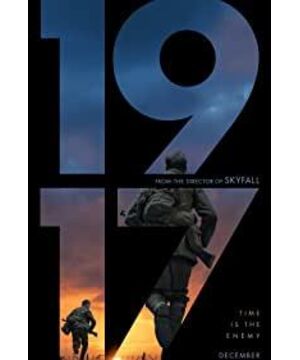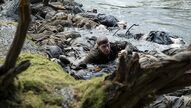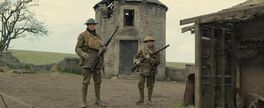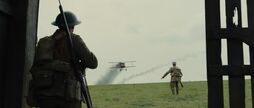Three poems appeared in the film.
The general at the beginning responded to why Scho sent only two people, saying " Down to Gehenna or up to the Throne, whether he travels to hell or ascends to the throne, He travels the fastest who travels alone. The person who travels alone travels the fastest." This is the work of the famous British writer Rudyard Kipling, the winner of the Nobel Prize in Literature in 1907. It is called "Winners." The authority of the general is conveyed through poetry, which not only foreshadows the accomplishment of the mission, but also unfortunately expresses the fate of Scho alone.
Scho's poem for a baby is one of the absurd poems of the English poet and painter Edward Lear. It is undoubtedly a deadly poem by the British poet and painter Edward Lear. It is undoubtedly a deadly poem by the British poet and painter Edward Lear. It indicates the risk of the road ahead and the absurd meaning of war.
The third poem is the quiet and soul-stirring "Wandering Strangers", which was sung by a soldier in the forest to hundreds of comrades-in-arms, conveying homesickness, reunion with relatives, and yearning for heaven. Excerpts from the three poems or the full text are attached:
1. General Erinmore quoted the poem "Winners" by Rudyard Kipling (1865-1936, who won the Nobel Prize in Literature in 1907). The first section is as follows:
What the moral? Who rides may read. What is morality? The rider can understand.
When the night is thick and the tracks are blind
A friend at a pinch is a friend, indeed,
But a fool to wait for the laggard behind.
Down to Gehenna or up to the Throne,
He travels the fastest who travels alone. He travels the fastest who travels alone.
2. Scho recites the works of the English poet and landscape painter Edward Lear (1812-1888), which comes from his collection A Book of Nonsense "Collection of humorous poems":
They went to sea in a Sieve, they did,
In a Sieve they went to sea:
In spite of all their friends could say, no matter what all their friends say
On a winter's morn, on a stormy day,
In a Sieve they went to sea!
Far and few, far and few,
Are the lands where the Jumblies live;
Their heads are green, and their hands are blue, their heads are green, and their hands are blue,
And they went to sea in a Sieve.
3. American folk songs sung by soldiers: The Wayfaring Stranger
Because it is an ancient folk song, there are many versions of lyrics, this is the version in the movie.
I am a poor wayfaring stranger
I'm traveling through this world of woe
Yet there's no sickness, toil nor danger
In that bright land to which I go
I'm going there to see my Father
I'm going there no more to roam
I'm only going over Jordan
I'm only going over home
I know dark clouds will gather around me
I know my way is rough and steep
Yet golden fields lie just before me
Where God's redeemed shall ever sleep
I'm going home to see my Mother
And all my loved ones who've gone on
I'm only going over Jordan
I'm only going over home
In the song, the Jordan River system quotes the Bible's "Old Testament·Joshua". The wandering Israelites crossed the Jordan River and came to the bright land promised by God—the beautiful land of Canaan flowing with milk and honey.
View more about 1917 reviews











